Photographer Roberta Neidigh became interested in these in-between spaces while walking through neighborhoods just outside her city’s downtown. Growing up on 100 acres of rural countryside in northern Indiana made her curious about the different ways people establish boundaries and express themselves through their landscaping in the Northern California suburbs, but the real draw for her was imagining the stories behind how the boundaries were created. “People have such different ideas, tastes and forms of expression colliding together, which adds tension that can be revealing,” she says.
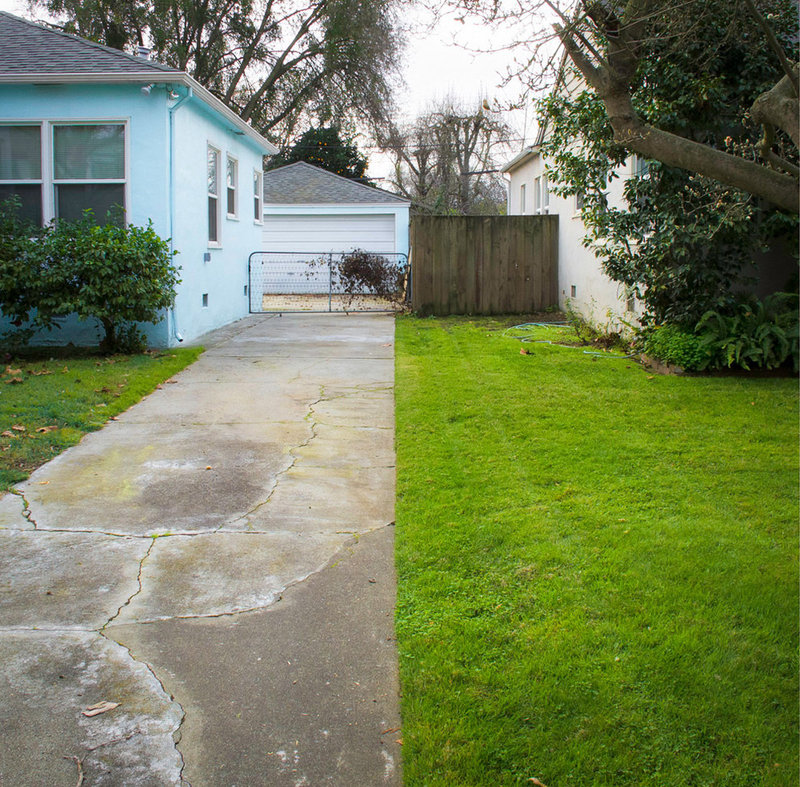 Roberta Neidigh
Save to Ideabook
Email Photo
So she began quietly taking photographs from sidewalks, gathering enough alluring images for a series called Property Lines, which will be on display at Photo L.A. in January 2014.
Roberta Neidigh
Save to Ideabook
Email Photo
So she began quietly taking photographs from sidewalks, gathering enough alluring images for a series called Property Lines, which will be on display at Photo L.A. in January 2014. She doesn’t speak to the homeowners, preferring instead to let the intersection of two personalities expressed through various landscaping methods tell the story. “I’m more interested in imagining who they are than finding out who they actually are,” she says.
She’s drawn most to properties that are almost exclusively maintained by the homeowner. “It’s just more interesting than a perfectly landscaped property that’s been professionally designed. When a homeowner is very much in charge, you can see what they have to say about themselves,” she says.
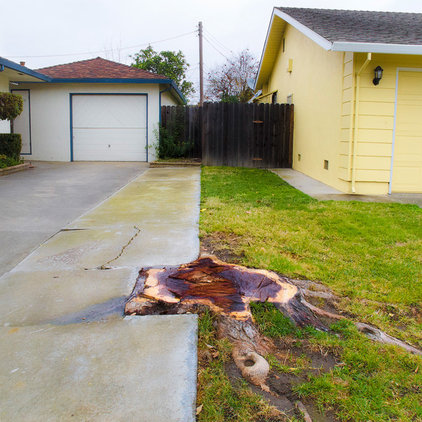 Roberta Neidigh
Save to Ideabook
Email Photo
The unanswered mysteries fuel her curiosity. For example, here you can see that the concrete slab on the left appears to have been added when the tree was still standing, and the pavers had to go around it. The roots cracked part of the slab, and the tree was cut down. “Who owned that tree? Who planted it?” Neidigh asks. “Maybe the people have known each other a long time. It looks to me like someone wasn’t very happy that they had to go around the tree. … Maybe the tree died because of the concrete laid around it.”
Roberta Neidigh
Save to Ideabook
Email Photo
The unanswered mysteries fuel her curiosity. For example, here you can see that the concrete slab on the left appears to have been added when the tree was still standing, and the pavers had to go around it. The roots cracked part of the slab, and the tree was cut down. “Who owned that tree? Who planted it?” Neidigh asks. “Maybe the people have known each other a long time. It looks to me like someone wasn’t very happy that they had to go around the tree. … Maybe the tree died because of the concrete laid around it.”
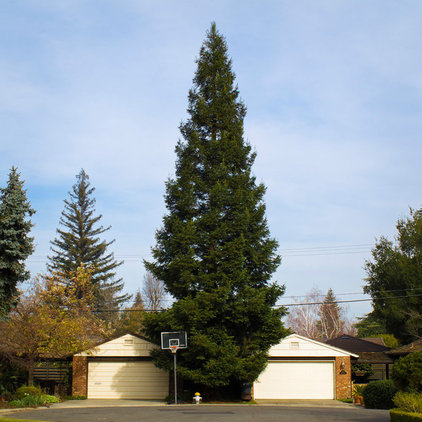 Roberta Neidigh
Save to Ideabook
Email Photo
Time also interests her. The neighborhoods she explores most are somewhat older, and the inhabitants are people who’ve lived there a long time. “They made these landscape decisions years ago, and now they’re elderly, still maintaining the plants, but it’s out of scale now. It’s like the plants are almost part of them.”
Roberta Neidigh
Save to Ideabook
Email Photo
Time also interests her. The neighborhoods she explores most are somewhat older, and the inhabitants are people who’ve lived there a long time. “They made these landscape decisions years ago, and now they’re elderly, still maintaining the plants, but it’s out of scale now. It’s like the plants are almost part of them.” In this photo a towering cypress tree straddles two properties, begging the question, Who does that tree belong to? “It might be shared,” Neidigh says. “It’s kind of curious to me that they obviously talked to each other. You can create ways of being more harmonious by working together visually, but that doesn’t always happen.”
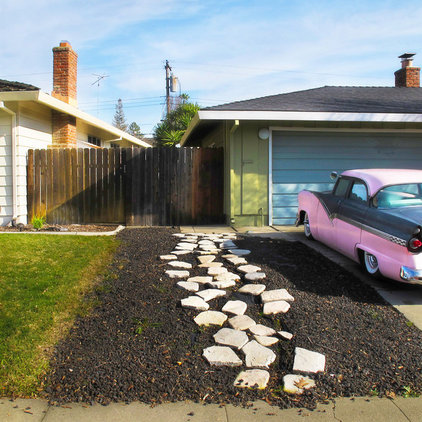 Roberta Neidigh
Save to Ideabook
Email Photo
This is one of her favorites. Neidigh happened to be driving down the road one day and saw the area out of the corner of her eye. She pulled over and was fascinated by the polarity of the two properties. A homeowner with a classic car has a colorful home that sidles up to a house that’s rather plain. “These are obviously people who enjoy the visual; they have their own voice, and it’s strong,” she says. “There’s nothing beyond ordinary about the other house. I’ve tried to find this house again, but I can’t. It was just one of those perfect moments.”
Roberta Neidigh
Save to Ideabook
Email Photo
This is one of her favorites. Neidigh happened to be driving down the road one day and saw the area out of the corner of her eye. She pulled over and was fascinated by the polarity of the two properties. A homeowner with a classic car has a colorful home that sidles up to a house that’s rather plain. “These are obviously people who enjoy the visual; they have their own voice, and it’s strong,” she says. “There’s nothing beyond ordinary about the other house. I’ve tried to find this house again, but I can’t. It was just one of those perfect moments.”
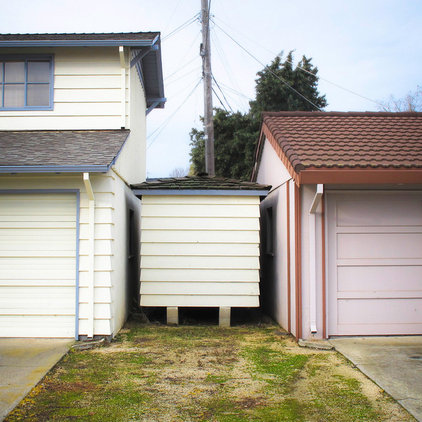 Roberta Neidigh
Save to Ideabook
Email Photo
This one makes her laugh. It’s a shed directly between two houses. The color and style would indicate that it belongs to the owner on the left, but it’s clearly encroaching into the neighbor’s property on the right. “Why would that be OK?” Neidigh says. “It’s intriguing to me.”
Roberta Neidigh
Save to Ideabook
Email Photo
This one makes her laugh. It’s a shed directly between two houses. The color and style would indicate that it belongs to the owner on the left, but it’s clearly encroaching into the neighbor’s property on the right. “Why would that be OK?” Neidigh says. “It’s intriguing to me.”
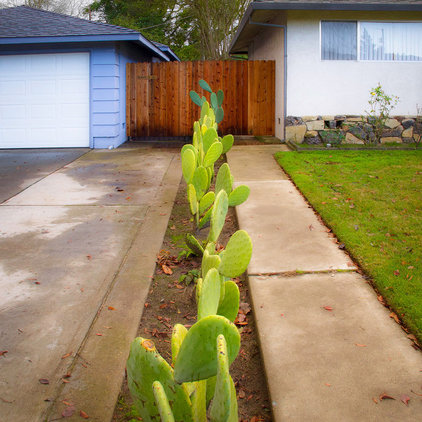 Roberta Neidigh
Save to Ideabook
Email Photo
What she’s not doing in her observations and photographs is making judgments about whether the property lines are good or bad. “It’s just visually interesting to me,” she says.
Roberta Neidigh
Save to Ideabook
Email Photo
What she’s not doing in her observations and photographs is making judgments about whether the property lines are good or bad. “It’s just visually interesting to me,” she says. Instead Neidigh seeks out these “multifaceted phenomenon” property lines because they are in the minority. “I’m looking for the ones that are the most compelling in different ways,” she says. “Some images are harmonious.”
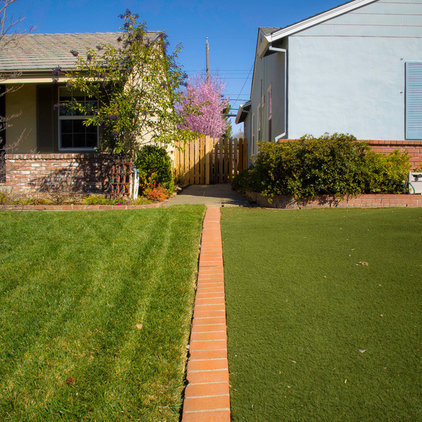 Roberta Neidigh
Save to Ideabook
Email Photo
Indeed, for some of the properties, one has to wonder if the neighbors collaborated on their shared property line. You get a sense that the neighbors here often stroll across the yards to pay a visit or borrow sugar.
Roberta Neidigh
Save to Ideabook
Email Photo
Indeed, for some of the properties, one has to wonder if the neighbors collaborated on their shared property line. You get a sense that the neighbors here often stroll across the yards to pay a visit or borrow sugar.
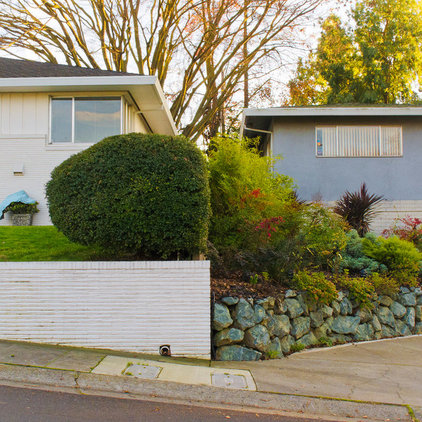 Roberta Neidigh
Save to Ideabook
Email Photo
For others you get the sense that the two homes were created miles apart, but that over time shifting tectonic plates brought them together.
Roberta Neidigh
Save to Ideabook
Email Photo
For others you get the sense that the two homes were created miles apart, but that over time shifting tectonic plates brought them together.
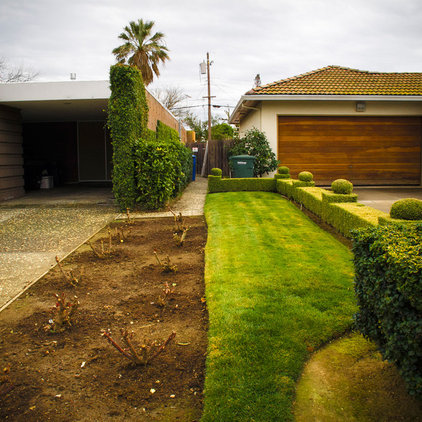 Roberta Neidigh
Save to Ideabook
Email Photo
It’s hard not to wonder what the homeowner on the right thinks while tending to this small strip of lawn and detailed hedges. Someone must walk around and enter the plot from the street or down the neighbor’s small path to cut it with a lawnmower. And what is it like to carefully trim the bright green lawn edge as it butts up against that dormant rose bed?
Roberta Neidigh
Save to Ideabook
Email Photo
It’s hard not to wonder what the homeowner on the right thinks while tending to this small strip of lawn and detailed hedges. Someone must walk around and enter the plot from the street or down the neighbor’s small path to cut it with a lawnmower. And what is it like to carefully trim the bright green lawn edge as it butts up against that dormant rose bed?
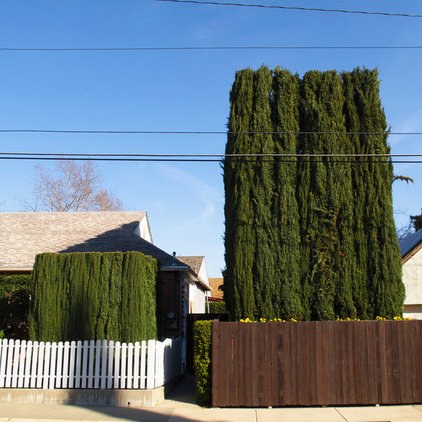 Roberta Neidigh
Save to Ideabook
Email Photo
Similar trees. Similar widths. But two completely different sizes. Are the taller ones for privacy, aesthetics or both? The fence on the right is dark and tight, while the one on the left is white and open. Could this indicate that one homeowner is more private?
Roberta Neidigh
Save to Ideabook
Email Photo
Similar trees. Similar widths. But two completely different sizes. Are the taller ones for privacy, aesthetics or both? The fence on the right is dark and tight, while the one on the left is white and open. Could this indicate that one homeowner is more private?
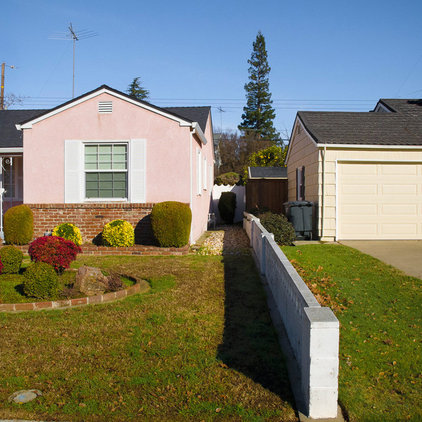 Roberta Neidigh
Save to Ideabook
Email Photo
These half walls are interesting. While it’s clearly easy for anyone to step over the small wall into the neighboring yard, the structure still makes a big statement, clearly indicating whose property belongs to whom.
Roberta Neidigh
Save to Ideabook
Email Photo
These half walls are interesting. While it’s clearly easy for anyone to step over the small wall into the neighboring yard, the structure still makes a big statement, clearly indicating whose property belongs to whom.

